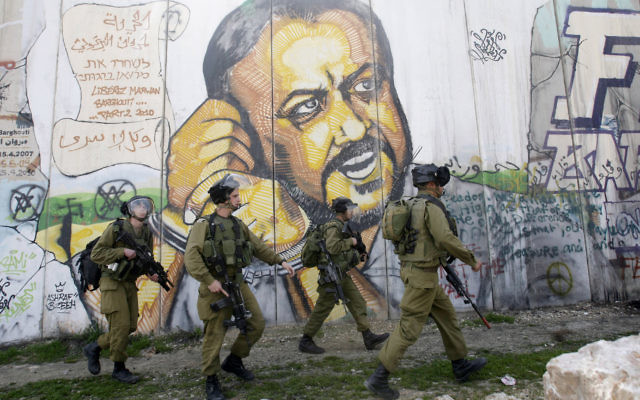Palestinian leader calls for ‘large-scale resistance’
IN a region where talk is cheap, many hardline statements on the Palestinian side can be dismissed as rhetoric. But in an Israeli prison cell this week, one Palestinian leader penned a message that could prove a game changer.
IN a region where talk is cheap, many hardline statements on the Palestinian side can be dismissed as rhetoric. But in an Israeli prison cell this week, one Palestinian leader penned a message that could prove a game changer.
Marwan Barghouti was a leader – and to many Palestinians a hero – of the Second Intifada. Today, when you drive through Palestinian parts of the West Bank, iconic pictures of him are everywhere – on posters calling for his freedom, on billboards, and painted on the security barrier. Polls suggest that if he stood for Palestinian president, he would win hands down.
In his public message last week he wrote: “The Palestinian Authority must stop all coordination with Israel – economic and security – and work towards Palestinian reconciliation.” He called for “large-scale popular resistance”, which some Palestinians are interpreting as code for a third intifada.
He wrote: “Stop marketing the illusion that there is a possibility of ending the occupation and achieving a state through negotiations after this vision has failed miserably.”
He claimed that all tactics, seemingly including violence, are fair game in areas captured by Israel in 1967, which include East Jerusalem and the West Bank. “It is the Palestinian people’s right to oppose the occupation by all means and the resistance must be focused on the 1967 territories,” he argued.
Words like these from any Palestinian with Barghouti’s influence are significant. But what makes the statement from this particular man so important is that many Israelis have long pinned their hopes on him to adopt the very path of negotiated peace that he is now rejecting.
Since 2004 he has been serving five life sentences plus 40 years in an Israeli prison, after a court ruled that he was guilty of five counts of murder, one of attempted murder, conspiracy to murder, and activity and membership in a terrorist organisation during the Second Intifada. He was also a leader of the First Intifada, during which he was arrested by Israel and deported to Jordan, where he lived until 1994 when he was allowed, under the Oslo Accords, to return.
But despite his bloody past, there has been a belief that he could prove to be just the partner Israel needs for an agreement. “Freeing Gilad Shalit is a moral act. Freeing Marwan Barghouti is a wise act,” claimed newspaper advertisements by left-wing group Gush Shalom during the Shalit campaign. Yet optimism about Barghouti has not been limited to the peace camp. President Shimon Peres has declared in the past that were Barghouti chosen as Palestinian president he would issue a pardon, and some MPs, including Meir Sheetrit of Kadima, have advocated freeing him to help bring about peace.
Why has he inspired confidence? Because he is seen as straight talking, and in possession of the power to impose democracy, law and order on a fledgling Palestinian state. He is considered to have the background in so-called resistance needed to make Palestinians respect him, but an appreciation of the benefits of a peaceful path that could allow him to change the Palestinian discourse. Further heightening his appeal to Israelis is the fact that there is a lack of other potential successors to the current Palestinian President, Mahmoud Abbas, and his two-state vision.
Now, however, Barghouti has clearly stated that if he enters top-level politics, he will be a very different type of politician to Abbas – and he will not fit the mould that many Israelis wish he would.
As for his call for “resistance” using “all means”, the question of whether there will be a third intifada is open, but Barghouti’s new position will give a major boost to the Palestinian camp that wants one.
NATHAN JEFFAY


comments